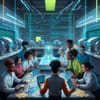The advent of artificial intelligence (AI) has revolutionized various fields, including experimental design. Traditional experimental design methods, which rely heavily on human intuition and expertise, are being augmented by AI-driven approaches.
AI can facilitate the design of experiments by analyzing vast amounts of data to identify optimal experimental conditions, reducing the need for trial and error. Additionally, AI can generate novel experimental designs that humans may not have considered, leading to new insights and discoveries.
The integration of AI in experimental design also raises important questions about the role of human expertise, the potential for bias in AI-driven designs, and the need for new skills and training.
As AI continues to transform the field of experimental design, researchers must adapt to these changes and develop new methodologies that combine the strengths of human creativity and AI-driven analysis.


